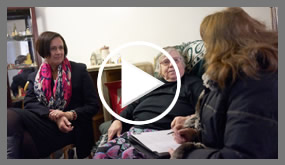![]() Models of Care
Models of Care
See associated grant program:

Care for our nation’s most vulnerable older adults currently is costly and perilous. The price tag for high rates of avoidable hospital readmissions for older adults is estimated to exceed $17 billion annually. And the cost of care for older Americans through Medicare and Medicaid accounted for 36 percent of total health care spending in 2011. Meanwhile, more than 1.5 million adverse drug events occur each year, many due to preventable medication errors that are disproportionately occurring among older adults.
Since the 1990s, the Foundation has invested in the development, testing, and spread of effective and affordable models of care to address the obstacles that keep older Americans from getting the high-quality, cost-effective care they deserve.
Our support of the Center to Advance Palliative Care has helped spread palliative care to two-thirds of our nation’s hospitals. Several care models have been developed and disseminated, such as HomeMeds Medication Management, which uses technology to help frail older adults who live independently at home to manage their medications.
Under our new strategic direction, we continue to support innovative models of care, making it one of our top priorities.
We recognize that success will only be achieved through partnerships with philanthropy, health systems and government agencies, policymakers, providers, researchers, and older adults and their families. Working together, we aim to make evidence-based models that deliver quality care with better outcomes at a lower cost accessible to older Americans who need them.
Examples include:
Funding: $1,612,922 over four years to the Icahn School of Medicine at Mount Sinai.
What It Does: Provides for more in-depth analysis in the evaluation of a $9.6 million federal demonstration to test a version of Hospital at Home called the Mobile Acute Care Team, which brings hospital-level care for certain conditions into an older patient’s own residence. Also supports development of technical assistance resources in anticipation of a successful demonstration.
Partner: The Center for Medicare and Medicaid Innovation.
Funding: $1.6 million over four years to Paraprofessional Healthcare Institute (PHI), Inc.
What It Does: Supports a $9 million “Philanthropic Equity” fundraising campaign that will enable PHI to improve the jobs of more than 200,000 direct-care workers—also known as aides or paraprofessionals who provide in-home care—per year, thereby improving care annually for at least 400,000 low-income older adults and people living with disabilities.
Partners: F.B. Heron Foundation, The Clark Foundation, Booth Ferris Foundation.